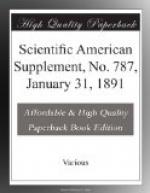A process invented by Stockmuir and Fleischmann, and worked out by them in the chemical laboratory of the Bavarian Industrial Museum, is, however, exceedingly simple, and is employed in many establishments.
In order to remove silver from a potassium cyanide silver solution, it is only necessary to allow a clean piece of plate zinc to remain in the liquid for two days; even better results are obtained by the use of iron conjointly with the zinc. In the first case, the silver often adheres firmly to the zinc, while in the second it always separates out as a powder. It is then only necessary to wash the precipitated powder, which usually contains copper (since spent silver solutions always contain copper), dry it, and then dissolve it in hot concentrated sulphuric acid, water being added, and the dissolved silver precipitated by strips of copper. The silver thus obtained is perfectly pure. If the amount of copper present is only small, it can usually be removed by fusing the precipitated powder with a little niter and borax.
In this way a spent silver bath was found to contain per liter
1st experiment
1.5706 grms.
2d " 1.5694 "
------
Mean 1.5700 "
The presence of silver could not be qualitatively ascertained in the residual liquor.
Although sheet zinc, or zinc and iron sheets, serve so well for the precipitation of silver, they cannot be employed for the recovery of gold. The latter separates out in such a case very incompletely and as a firmly adhering lustrous film in the zinc. On the other hand, finely divided zinc, the so-called zinc dust, is an excellent substance to employ for precipitating gold quantitatively and in the form of powder from spent cyanide liquors. When zinc dust is added to a spent gold bath and the liquid periodically stirred or shaken, all the gold is precipitated in two or three days. The amount of zinc to be added naturally depends on the quantity of gold present. Freshly prepared gold baths for gilding in the cold contain on the average 3.5 grms. gold per liter, while those used for the hot process contain 10.75 grms. To precipitate all the gold in the original bath, 1.74 grms. or 0.37-0.5 grms. zinc dust would be necessary, and, of course, a much smaller quantity would be sufficient for the spent liquors. Since the precipitation takes place more rapidly when an excess of zinc dust is present, it is generally advisable to add 1/4 or at the most 1/2 kilo, of zinc dust to every 100 liters of solution.
The precipitated gold, which contains zinc dust and usually silver and copper, is washed, freed from zinc by hydrochloric acid, and then from silver and copper by nitric acid and thus obtained pure.
A spent bath treated in this way gave the following amounts of gold per liter:




